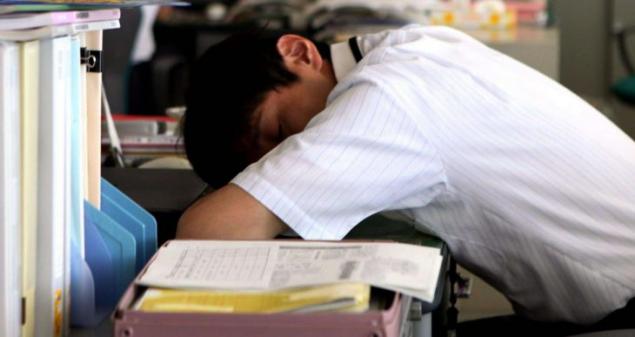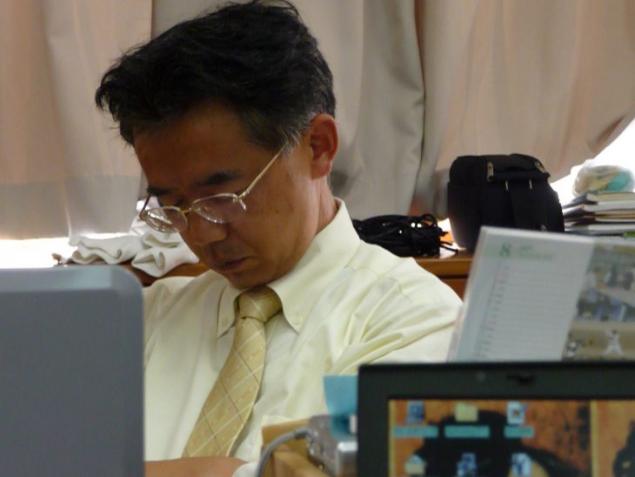687
"Inemuri" - a striking Japanese art never sleep
The Japanese never sleep. They practice "inemuri" - the ability to make up for the lack of sleep at work, in transport, in the supermarket, on the street or any other public place. < Website tells how to "sleep" with "knowingly be present" in some place, and why the Japanese refused to normal sleep.

Bbci.co.ukDoktor anthropologist Brigitte Steger remembers the first time faced with this phenomenon, when I came to the Land of the Rising Sun in 1980. During this period, Japan's economy entered a phase of "bubble" - incredible speculative frenzy. The daily life of the Japanese was as feverish. People sacrificed their schedule business and personal meetings so tightly that at the time was no more a dream. Businessmen try to win from sleep as much as possible and be proud of these
«victories».
Huffpost.comV this time the Japanese subway reminded "sleepy" - flows sluggish drowsy people came in wagons, joined up somewhere and immediately immersed asleep. Some managed to sleep standing up, and no one is surprised.
< So to forge a positive image of the Japanese "industrious bees», which neglects night's sleep, do not allow yourself to bask in the bed in the morning, but "gets "Lack of sleep using the" inemuri "- the ability to take a nap whenever possible: in transport, during a meeting or lecture
.
Atresmedia.com If a Japanese man, woman or child suddenly feel the need to sleep for ten minutes at any place and in any position, it can with a clear conscience to do so without fear of censure or oblique views.
In this curious phenomenon, according to Dr. Steger is a strange contradiction: if you sleep in bed is considered a sign of idleness, why then sleep in the middle of the day is not perceived as a sign of laziness? What sense to encourage the children to sit on the lessons until late at night, the next morning if they will sleep in the classroom?

Florianwachter.com But this is not the only oddity concerning the Japanese sleep.
As is known, in many countries, parents almost from birth teach children to sleep alone - each offspring relies own room and a strict schedule of sleep and wakefulness. The Japanese is a completely opposite approach. Here, parents and doctors believe that at least until the school-age children should not sleep alone, to grow independent and socially affluent adults. Perhaps partly why many Japanese adults admit that they feel more comfortable to sleep in the presence of other people than alone.
In addition, in some sense inemuri - this is not a dream. It is very different from a normal night's sleep in the bed, and on the afternoon slumber. The trick is in the term. It consists of two opposed, it would seem, within the meaning of the words: "and" - means "present" and "Nemours" - means "to sleep»
.
Freeshareknowshare.comKazhdomu of us are familiar with this situation: we are physically present at some meeting (lectures, meeting), but thoughts are somewhere far (dive into the warm sea, compose a family dinner menu). We somehow feel that anything is very important at this time for us does not happen, and are always ready to "go down to the ground" when it is needed. Roughly the same thing happens with sleeping on the Japanese working meetings. < They are physically present, albeit unconscious and always, if necessary, may be involved in the work. In addition, the meetings often take several hours and are as boring hearing reports.
And if a person came to the meeting in spite of the extreme fatigue - it means that he is a very responsible and deserves respect. So let her sleep.
via mixstuff.ru/archives/110774

Bbci.co.ukDoktor anthropologist Brigitte Steger remembers the first time faced with this phenomenon, when I came to the Land of the Rising Sun in 1980. During this period, Japan's economy entered a phase of "bubble" - incredible speculative frenzy. The daily life of the Japanese was as feverish. People sacrificed their schedule business and personal meetings so tightly that at the time was no more a dream. Businessmen try to win from sleep as much as possible and be proud of these
«victories».

Huffpost.comV this time the Japanese subway reminded "sleepy" - flows sluggish drowsy people came in wagons, joined up somewhere and immediately immersed asleep. Some managed to sleep standing up, and no one is surprised.
< So to forge a positive image of the Japanese "industrious bees», which neglects night's sleep, do not allow yourself to bask in the bed in the morning, but "gets "Lack of sleep using the" inemuri "- the ability to take a nap whenever possible: in transport, during a meeting or lecture
.

Atresmedia.com If a Japanese man, woman or child suddenly feel the need to sleep for ten minutes at any place and in any position, it can with a clear conscience to do so without fear of censure or oblique views.
In this curious phenomenon, according to Dr. Steger is a strange contradiction: if you sleep in bed is considered a sign of idleness, why then sleep in the middle of the day is not perceived as a sign of laziness? What sense to encourage the children to sit on the lessons until late at night, the next morning if they will sleep in the classroom?

Florianwachter.com But this is not the only oddity concerning the Japanese sleep.
As is known, in many countries, parents almost from birth teach children to sleep alone - each offspring relies own room and a strict schedule of sleep and wakefulness. The Japanese is a completely opposite approach. Here, parents and doctors believe that at least until the school-age children should not sleep alone, to grow independent and socially affluent adults. Perhaps partly why many Japanese adults admit that they feel more comfortable to sleep in the presence of other people than alone.
In addition, in some sense inemuri - this is not a dream. It is very different from a normal night's sleep in the bed, and on the afternoon slumber. The trick is in the term. It consists of two opposed, it would seem, within the meaning of the words: "and" - means "present" and "Nemours" - means "to sleep»
.

Freeshareknowshare.comKazhdomu of us are familiar with this situation: we are physically present at some meeting (lectures, meeting), but thoughts are somewhere far (dive into the warm sea, compose a family dinner menu). We somehow feel that anything is very important at this time for us does not happen, and are always ready to "go down to the ground" when it is needed. Roughly the same thing happens with sleeping on the Japanese working meetings. < They are physically present, albeit unconscious and always, if necessary, may be involved in the work. In addition, the meetings often take several hours and are as boring hearing reports.
And if a person came to the meeting in spite of the extreme fatigue - it means that he is a very responsible and deserves respect. So let her sleep.
via mixstuff.ru/archives/110774























